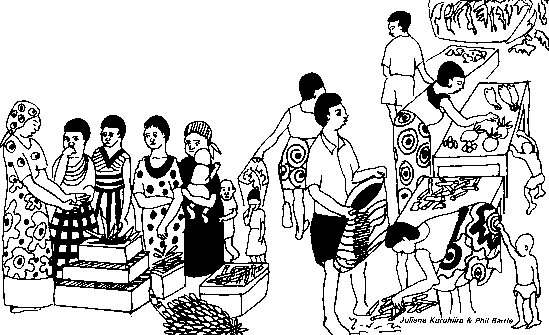Translations:
Other Pages:
Key Words
Modules
Sociology:
Home Page
Lecture Notes
Discussions
Utilities
Site Map
Contact
Utility Documents
Useful Links
Modules
Home Page
Lecture Notes
Discussions
Site Map
Contact
Utility Documents
Useful Links
URBAN GARDENING
by Phil Bartle and David Stott
Training Handout
This training module is for community mobilisers, but familiarity with a limited number of agricultural principles will be of some use. If you do not have any agricultural background, enough will be provided here, and some web links will lead you to more specific documents about the agricultural side of this.
Let us start with an intermediate stage in the community empowerment process. You have organised the community members; perhaps they have successfully completed a community project, and they are looking around for more to do.
If you do not have mobilisation training or experience, see the Mobilizer Handbook, and perhaps the Mobilisation module.
When you review with community members and they list their various priority goals, they might well suggest that they are ready for income generation. You may wish to see the three modules on Income Generation. That work, however, is somewhat more elaborate than this urban gardening project, and perhaps it would be useful to start a little more modestly, Urban gardening can be seen as a form of income generation.
It is important here that you do not impose this choice on your community members, but you can help them include it in a list of possibilities, and let them chose. Remember the methods of Socrates. There is nothing wrong with listing or discussing the pros and cons of various alternatives. See: Brainstorming.
You should aim for a combination of group and individual efforts: this has worked where the neighbourhood group creates and maintains the compost and plot of land, but individuals plant, tend and reap individual vegetables. Discuss this with your community members, and listen if some of them have an alternative organising strategy.
You might eventually have an overall association, members all belonging to separate plot groups, each plot group being linked to a separate plot of land.
An optimum size for a plot would be about three metres by four metres, but this can be varied according to what is available.
Any land will be suitable, but you should remind members to watch out for land that had been used for light industry, such as auto repair. The petrol chemical wastes in the soil can hinder good plant growth.
Review the reasons for composting in contrast to using commercial fertilizers: fertilizers show early impressive returns but eventually spoil the soil, they increase the acidity, calling for application of lime, etc.
Commercial fertilizers are expensive and the farmers are dependent upon supply which is not always dependable, whereas the compost can be made from normal kitchen wastes and are always available.
Some mention must be made of avoiding pesticides. They are dangerous to the farmers, distributors, consumers and environment. Ash on the under side of leaves can reduce or remove nematodes (?).
Less need for water. ??
How do you go about organising the whole group and the plot groups?
Refer to the
Income Generation module and the formation of umbrella groups and trust groups.
Individuals in the group must then decide if they want to raise vegetables to sell, or to consume in the home. This gives rise to questions of marketing. See Marketing. You might suggest that exotic vegetables as grown in Europe, can be chosen for plots in the capital city or towns nearby. The national or regional capital city is where most expatriates live, working in businesses, aid groups and embassies. They are a potential market for exotic vegetables. You would best recommend vegetables that are consumed by nationals.
There may be a limited market in the capital city for flowers and decorative plants, especially shrubs and bushes used in gardens of wealthy residents, both expatriates and nationals.
Can the plot groups form an association? Can the association become a co-operative? These are questions you should ask from the beginning to well into the project.
You can organise plot groups at the initial meeting of all interested. Unlike the forming of trust groups for a micro credit scheme, a plot group should be organised around proximity to an available plot, and the willingness of its members to work together in developing the plot for gardening.
Throughout Africa, most farming is done by women; this project is appropriate for a women’s enhancement effort.
You can link a plot effort to other empowerment areas, as in the training modules, depending upon what the participants see as their priorities. Literacy. HIV, Water. Advocacy.
LINKS:
Larry Bonford:
The CRD - supported Compost Education Centre http://www.compost.bc.ca/ has one,
so does the Lifecycles Garden Training Project http://www.lifecyclesproject.ca/index.htm
Both of these groups have their roots firmly in Victoria.
Further afield, "City Farmer" http://www.cityfarmer.org/ the original urban agriculture web site still run by Michael Levinson from UBC gets over 1,000,000 hits/year on its massive web site.
They sell most of their info now. Ah! the good old days of free info on-line! How quickly that changed!
In Vancouver, the UBC Farm at: http://www.agsci.ubc.ca/ubcfarm/
The UBC Farm runs urban veggie workshops often. They have one tomorrow.
The GVRD Parks Dept. have an urban garden training project as part of their
Colony Farm Community Gardens at: http://www.gvrd.bc.ca/parks/ColonyFarm.htm and
http://www.parkpartners.ca/pdfs/PICSproposal.pdf
This last web link is a pdf that outlines what the GVRD is doing with a group of mostly Punjabi speaking farm workers to train them in small area garden enterpreneurship. I have not checked up on them this year, but they were still going strong at this time last year.
──»«──
At the Market Place:
 |